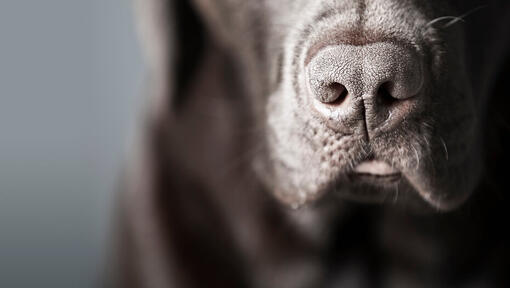
Dog owners often believe that a healthy dog’s nose should be wet and cold. Here is why dogs usually have wet noses and what it actually means if your dog has a dry nose instead.
Whether it’s when they sniff your face in the morning or your hand as you give them a treat, the sensation dog owners expect to feel on their skin when the dog’s nose makes contact is a very particular one: the nose should be cold and wet. But what does it mean when your dog’s nose is dry instead?
Keep reading to find out what makes a dog’s nose wet in the first place and how should an owner react if they discover that their pet’s nose is warm and dry.
Why do dogs have wet noses?
A dog’s sense of smell is a trusted ally helping them find out more about their environment. So, dogs have naturally figured out a few tricks to make it work better. One of them is keeping their noses wet. Scent particles stick to damp surfaces better, giving a dog with a wet nose a superior ability to understand their surroundings. It is one of the reasons why some dogs keep their noses wet by constantly licking them.
But your dog’s wet nose has another important function – it helps regulate their body temperature. You may have already noticed how wet their nose is on a hot day or after a good session of play or exercising.
Dogs don’t have sweat glands all over their body as humans do, because of their fur. Instead, they’ve got a whole different system helping them dissipate heat, including panting and using their noses and paws to sweat.
What does it mean if your dog has a dry nose?
If your dog’s nose is dry, you’re probably wondering whether this should be a cause for concern, and the answer is not necessarily. Wet or dry, your pet’s nose by itself doesn’t point to a health issue.
There are a few different factors to take into consideration when you notice that your dog’s nose is dry. Some of them explain why healthy dogs have dry noses, while others might be side effects of an underlying condition.
Dry nose in healthy dogs
Here are a few reasons why a healthy dog could have a dry nose:
Usual fluctuations during the day
Dogs noses can be wetter or drier depending on the time of day.
Dehydration after exercise
If your dog has had a particularly energetic game of fetch or any other strenuous activity, it is possible that their nose feels drier than usual. This is due to dehydration. Make sure there is plenty of water available for your dog at all times, but especially during and after playing or exercising.
After a nap
Some dogs keep their nose wet by constantly licking it. Naturally they won’t have a chance to do so during a nap. So, if you notice your dog’s nose being dry, it is possible that they’ve just woken up from slumber.
Warm environment
Whether it’s the summer heat or the radiator’s in the living room during cold season, exposure to dry, warm environments can make a dog’s nose drier than usual.
Age
A dog’s dry nose might also be related to age, as it has been noticed that some canines get drier noses in their golden years.
Dry dog nose and possible health issues
Here is what to look out for if you notice your dog’s nose is unusually warm and dry.
Severe dehydration
Dry nose can be a symptom of severe dehydration, alongside excessive panting, sunken eyes, lack of skin elasticity, lethargy and even vomiting. Always keep an eye on your dog’s daily water intake.Don’t hesitate to contact the vet if you’ve noticed any of these warning signs in your dog.
Sunburn
If your dog’s nose is not only dry, but also warm and visibly red, your pet might be suffering from sunburn. Get them inside straight away and check the rest of their skin for signs of sunburn. Severe cases of sunburn should get immediate medical attention, so get in touch with the vet if you suspect that’s the case.
Unusual nose discharge
Other than moisture, you should also check your dog’s nose to make sure there is no thickened discharge or bleeding that may indicate a health issue. Always check with your vet if you notice these symptoms as these could point to an infection.
In conclusion, a dry dog nose alone isn’t enough to decide whether your dog is healthy or sick. It’s important to keep an eye out for other factors as well. Give your four-legged companion regular once-overs and look out for any unusual signs. Here is a complete dog health checklist to help you through the process.










